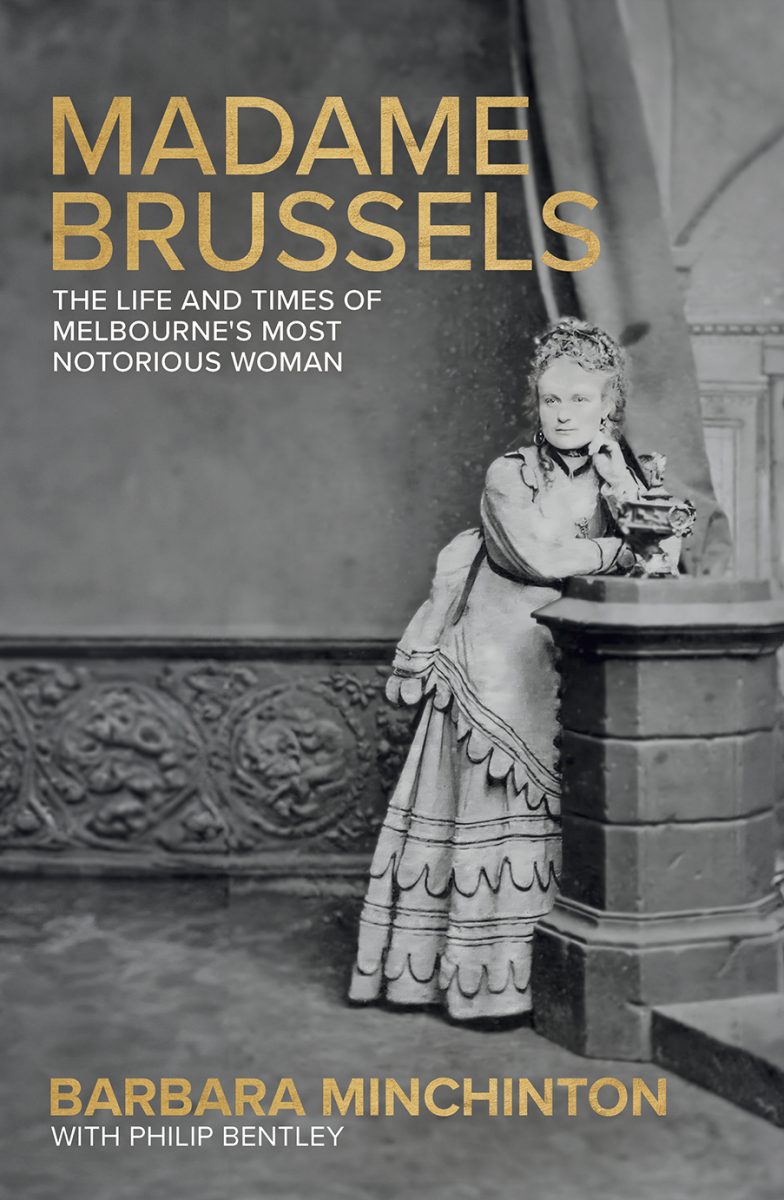
Madame Brussels: The Life and Times of Melbourne’s Most Notorious Woman is an enlightening biography of an enigmatic personality who helped shape the Victorian capital’s early days. Photo: Supplied.
An enlightening biography of an enigmatic personality who helped shape early Melbourne, Madame Brussels takes us on a fascinating journey through a colourful period in the Victorian capital’s history.
She is still remembered and celebrated today, but until now, little has been known about Caroline Hodgson, the woman behind the alter ego. Born in Prussia to a working-class family, Hodgson arrived in Melbourne in 1871. Left alone when her police officer husband was sent to work in remote Victoria, she turned her hand to running brothels.
Before long, she had proved herself brilliantly entrepreneurial: her principal establishment was a stone’s throw from Parliament House, lavishly furnished and catered to Melbourne’s ruling classes.
Hodgson rode Melbourne’s boom in the 1880s, weathered the storm of the Depression years in the 1890s and suffered in the moral panic of the 1900s. Her death in 1908 signified the end of one kind of Melbourne and the beginning of another: in terms of prostitution, the city went from tolerance to total interdiction in her lifetime.
Drawing on extensive research, author and historian Barbara Minchinton deftly pieces together Madame Brussels’ intriguing narrative. Hodgson’s story not only presents us with some understanding of the world in which she lived and worked, it also tells us about a regime that is still deeply embedded in Melbourne’s culture today.
“For many Melburnians, Madame Brussels is a cult figure of sorts,” Minchinton writes. “Since 2006, her name has been emblazoned on a popular rooftop bar in Melbourne’s central business district and Madam Brussels Lane now occupies the land where one of her brothels stood. Curious visitors can gaze at photographs of her as they sip their cocktails at the Little Lon Distilling Co., or take talking tours with guides describing events that took place in her time.
“In that context Madame Brussels is often presented as an amusing caricature from colourful days gone by, but Caroline Hodgson – the woman who so successfully created and marketed Madame Brussels and her establishments – actually represents much of what Melbourne was in the 19th century and what it became in the 20th.
“Her death in 1908 signified the end of one kind of Melbourne and the beginning of another: in terms of sex work the city went from uneasy tolerance to complete prohibition in the space of her working life, and she was a central figure in much of the politics surrounding the change. But despite the public’s enduring fascination with her, our understanding of Melbourne’s most famous brothel keeper and her business has been relatively superficial.”
Hodgson’s creation of Madame Brussels occurred at a formative time for Melbourne and left a substantial mark on its history, but she left few written words of her own. Some people were able to impart some insight that enabled the author to learn a little about Hodgdon as a person. It was thanks to Denis James, and Rosalie Savage, whose grandmother, Irene, was adopted and raised by Caroline Hodgson.
Divorce records also provide some insight into the failure of her second marriage. Few letters were written in her own hand, and there were no visitors’ books to reveal her networks. Family material found in 2018 provided some clues, a German genealogist found others, but for her biography the details of her life in Melbourne were largely sourced from newspapers, and government and police records.
Even Philip Bentley admits: “While I have been pleasantly surprised – and at times astonished – by just how much information on obscure doings from 150-odd years ago we have been able to claw back, some elements have still remained beyond us.”
Tracing Hodgson’s life has been a labour of curiosity, captivation and frustration for Minchinton. The book begins by piecing together the circumstances of Hodgson’s early life in Prussia. The second section describes her first few years in Melbourne and traces how she came to be running a brothel.
“By following her property investments, this story of Caroline Hodgson’s life teases out her accumulation of wealth and property in an unusual social setting, but it is also about the ordinary intersections of sex and power, the law and women’s rights in Victoria,” Minchinton reflects.
Madame Brussels was Melbourne’s most maligned brothel keeper. The story that emerged was one of Melbourne’s sex industry from 1871 to its criminalisation in 1908.
Madame Brussels: The Life and Times of Melbourne’s Most Notorious Woman, by Barbara Minchinton with Philip Bentley, La Trobe University Press, $36.99


